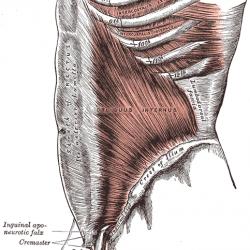4 Ways to Empower Yourself During Perimenopause

Source: Rasica/Shutterstock.com
Perimenopause is an often-overlooked transition period for women between the ages of 45 and 55 when the body begins to naturally prepare for menopause. As this journey through physical and emotional changes unfolds, it is essential that women equip themselves with the right tools to navigate this phase in their lives with strength and self-assuredness.
Unfortunately, perimenopause comes with its own set of social stigmas — from untrue associations with forgetfulness or mental decline to a general lack of conversation about how to best support yourself throughout this process. Women are not only forced to face debilitating symptoms such as hot flashes and insomnia alone, but many are also tricked into believing outdated narratives about perimenopause before having the opportunity to fully inform themselves. As a result, they're not given the education they need about help, like the benefits of hormone replacement therapy or natural supplements.
It doesn't have to be this way. By learning how to prioritize self-care, develop positive relationships, and gain access to resources suited for menopausal women, we can empower ourselves during this life-changing transition and lift each other up along the way. This article explores four ways women can take charge of their health during perimenopause by reclaiming control of their bodies.
1) Make Time for Self-Care
Taking time for ourselves can be difficult in the best of circumstances, especially when faced with life-changing transitions such as those associated with perimenopause. However, despite feeling overwhelmed by daily tasks or feeling guilty about taking a break from our obligations, it is important to remember that self-care is an essential and necessary part of taking control of our health during this journey.
Allowing yourself moments to relax and recharge is not an indulgence but essential. Give yourself permission to pause and become aware of your mental, physical, and emotional needs. Whether it's setting aside 15 minutes a day for meditation, therapeutic yoga classes, or hiking in nature, there are countless ways to reset your mind and body. To ensure you're making the most of this self-care time, try establishing specific goals beforehand and hold yourself accountable. Maybe you want to take notes on any thoughts or insights throughout your routine or write a journal entry afterward.

Source: wavebreakmedia/Shutterstock.com
Self-care also involves recognizing when help from professionals is needed. As we age, our bodies evolve and require personalized attention that only clinicians can provide. Therefore, establishing relationships with experienced care providers can be beneficial for long-term health management during menopausal years.
It's time that we prioritize ourselves first and create space for self-love without guilt or judgment so that we can start living our empowered lives.
2) Explore Different Treatment Options
Exploring different treatment options can be an empowering step on the path toward menopausal wellness. Being informed of the various resources available is key when it comes to managing symptoms ranging from hot flashes, night sweats, and mood swings to more serious issues such as cardiovascular disease and osteoporosis.
Hormone imbalance symptoms in women are common during perimenopause. Understanding its effects on your body helps you make informed decisions about potential treatments. It's important to note that hormone replacement therapy (HRT) and bioidentical hormones have become much safer in recent years and may be good choices for some women. In addition, natural remedies like dietary changes, herbal supplements, and botanical extracts may also relieve specific symptoms without troubling side effects.
No matter which option you choose, professional guidance is essential. Speak with your doctor or healthcare practitioner to learn more about what each treatment entails, if it is right for you, how long it will take to work, and whether any risks are associated with following a particular course of action. One-on-one consultations with specialists specializing in perimenopause can also help provide tailored advice based on your goals and individual needs. With the right combination of knowledge, support, and treatments available today, women can find the strength to embrace this new phase.
3) Connect with Like-Minded People
During perimenopause, it can be helpful to connect with other women who are going through similar experiences. A supportive community of like-minded people can provide a sense of understanding and strength that may otherwise be difficult to find.
The good news is that there are plenty of opportunities to join or create a community — whether online or in person — where you can ask questions, share stories, and get advice from individuals who truly understand what you're going through. Online forums like Reddit and Facebook groups offer an anonymous space to learn and connect with others. At the same time, local health clubs, gyms, and leisure centers often host regular meetups for those looking for company. Joining a local menopause support group is also an excellent way to form lasting connections with other women in your area.

Source: Dejan Dundjerski/Shutterstock.com
On top of the emotional support provided by belonging to a shared community, knowing that you have access to reliable information from trusted sources is invaluable. As well as providing much-needed reassurance during this time, connecting with other women in similar situations gives us the chance to share successes, too — sparking hope and inspiring each other toward achieving our goals.
4) Stay Informed About New Research
It's essential to stay informed about the latest research on treatment options for perimenopause symptoms. Advances in hormone therapy, natural remedies, and lifestyle changes are making it easier for women to get relief from their menopausal symptoms.
For instance, hormone replacement therapy (HRT) has become much safer in recent years and may be beneficial for some women. It can help alleviate hot flashes as well as prevent bone loss and other health risks associated with estrogen deficiency. On the other hand, bioidentical hormones may provide an alternative to traditional HRT, which involves taking synthetic hormones — though they should still be monitored by a healthcare professional.
As mentioned, a range of natural remedies can also help reduce perimenopause symptoms such as anxiety, depression, and insomnia. Dietary changes, herbal supplements, and botanical extracts have all been shown to benefit menopausal women differently. Additionally, lifestyle modifications such as regular exercise, adequate sleep, and stress management techniques can do wonders for your overall well-being during this time!
No matter which approach you choose to manage your menopausal symptoms, staying abreast of the new findings in the field offers valuable insights into recognizing and treating them. By being aware of the advances in research related to hormone therapy, natural remedies, and lifestyle changes, you will be better equipped to make informed decisions about your health.
Final Empowering Thoughts
Perimenopause can be a confusing and challenging time for many women, but it doesn't have to be. With the correct information and support, you can take proactive steps toward managing your symptoms in a way that fits your lifestyle and personal goals. By focusing on self-care, connecting with other women going through similar experiences, and staying informed about new research, you can confidently embrace this journey! So hang in there and remember — you got this!
More to Read:
Previous Posts:







